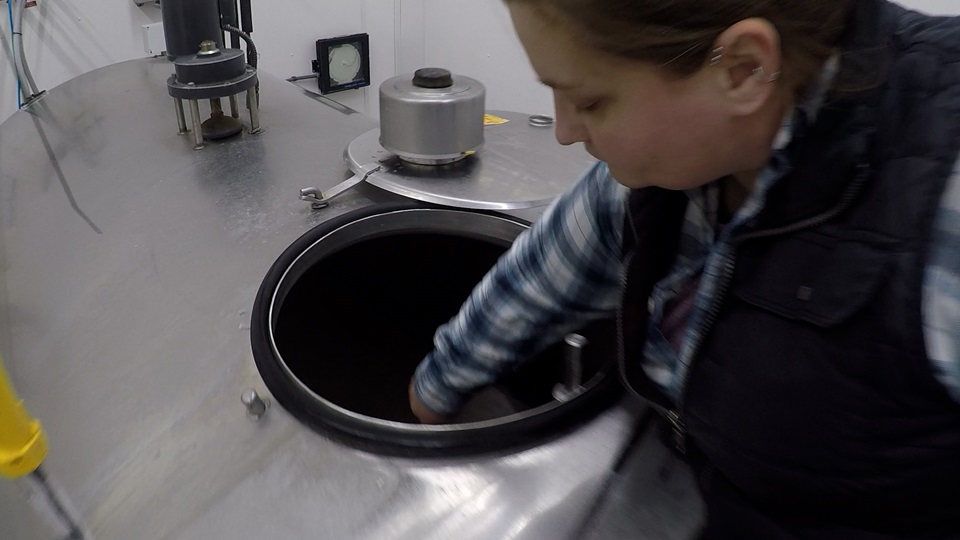
Image: Jessica Waterman of the VAAFM Food Safety and Consumer Inspection Division demonstrates the milk sampling procedure from an on-farm bulk milk tank at the UVM Dairy during training on December 13th, 2024.
Effort to protect dairy farms from spread of bovine HPAI infections will benefit animal health and Vermont’s dairy industry
January 2, 2025 | Montpelier, VT - Since the first detection of highly pathogenic avian influenza H5N1, or HPAI, in Texas dairy cattle this past March, the Vermont Agency of Agriculture, Food & Markets (VAAFM) has worked to promote awareness and prepare for the possibility of the disease’s arrival in our state. To date, this has not occurred. USDA recently mandated bulk milk sampling throughout the country, including Vermont, to proactively identify any currently unknown infected cattle. The goal is to test all milk that is eligible to cross state lines (Grade A) so any unknown infections can be identified and HPAI can be contained.
Beginning today, VAAFM employees will sample unpasteurized milk on all Grade A milk producing farms in Vermont each month. The samples will be tested in a lab for the HPAI strain that has infected dairy cattle in 16 states. Vermont has not seen any indication of this HPAI strain, though Vermont has experienced isolated incidents of the avian, or bird flu strain of HPAI, including as recently as last week.
The milk testing program is designed to identify any currently unknown pockets of the dairy cattle HPAI strain to help eradicate it in the United States, protect animal and human health, and safeguard the food supply from disruptions. Importantly, eliminating this version of the HPAI virus would prevent it from mutating into a strain that could threaten human health.
Before starting this USDA funded sampling program in Vermont, VAAFM notified dairy farmers statewide by letter (see attached) and worked with affiliated dairy co-ops and partners to help spread the word. Specially trained Agency employees will visit each dairy farm once a month to sample the farm’s milk. Farms will not bear any costs of the sampling program, and no related changes in operations are expected.
If a sample tests negative, no further action will be taken. If a sample test is positive, the dairy farm will be notified, and Agency dairy officials will work with the farm to ensure all unaffected raw milk is pasteurized before being marketed. Any abnormal milk produced would be disposed of safely. This would occur in conjunction with the Vermont State Veterinarian and Animal Health staff working to ensure that each farm has the resources in place to help prevent spread of the virus to other locations, while also supporting on-site care to affected cows.
Since the first impacted dairy herds were identified in March of 2024, pasteurization has proven effective at inactivating the HPAI virus, which makes milk safe for human consumption. However, infected cows often produce “abnormal” milk, which requires disposal. Infected dairy cattle usually do not experience life-threatening illness and recover. Moreover, only a small number of humans have contracted infections from working with infected dairy cattle, and nearly all infections have been minor. The risk to humans is considered to be low, but in particular for farmers and others who work with raw milk or animals, it is important to be knowledgeable and vigilant. The Agency wants to help Vermont dairy farms to remain HPAI free and testing milk for HPAI in our state will help ensure that any infections are known and properly addressed.
More Information here:
- USDA Mandated Silo Sampling & Monitoring Program for HPAI in Vermont – VAAFM
- Vermont Bulk Milk Sampling FAQ's & More Resources - VAAFM
- Investigation of Avian Influenza A (H5N1) Virus in Dairy Cattle - FDA
- H5N1 Bird Flu: Current Situation - CDC
- Avian Influenza (Bird Flu) in Humans – Vermont Department of Health
More Imagery: Demonstration of Sampling Imagery and Video – VAAFM Social Media
